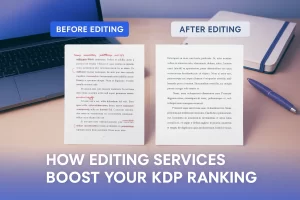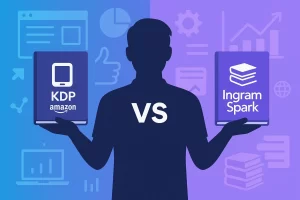It’s not simply getting your book in stores; your book-selling journey goes beyond book launch. It’s about building a sustainable readership and capturing your value proposition in the market. So, suppose you are an experienced book publisher and have extensive knowledge and practical skills in book marketing and the publishing process. In that case, you must have noticed that pre-launch book marketing is not solely enough for book promotion. Building anticipation and creating buzz around your published manuscript requires you to employ post-publication marketing approaches that streamline your book marketing efforts and make your publication thrive in the competitive publishing landscape.
With increased competition, book marketing agencies struggle to establish online visibility and attract new readers. An uprising challenge for authors and publishers is the discoverability of the published book. Nearly 11,000 books are published per day and reach book stalls. However, many of the publications remain unnoticed by potential audiences. Since the manuscript lacks visibility, it fails to make a lasting impact in the book marketing industry.
In Effective Post-Launch Marketing Efforts Impact Book Discoverability and Visibility
Small publishers and self-publishing companies encounter several post-book launch challenges. New and inexperienced book marketers lack knowledge of market saturation and changing market dynamics. Moreover, they have no idea of ongoing book marketing innovation and ever-changing consumer trends and preferences.
Digital transformation in marketing and publishing has shifted readers’ preferences from physical copies to e-books and other digital formats. Increased market competition has posed hurdles for novice publishers to develop online book publishing campaigns and enhance book club endorsements. Inexpert publishers fail to penetrate new diversified markets, unable to meet the rising demands of consumers and boost their brand identity. Lacking knowledge about book advance earnings, higher royalty rates, and revenue generation makes it difficult for inept publishers to bring high sales and revenue, and also to strive hard to build an author’s online presence.
Publishing companies that ignore a targeted market approach fail to implement a well-organized and iterative book launch strategy. They also face severe consequences such as reduced customer engagement, lower retention rates, and a sharp decline in sales and market share. Adopting a smart marketing strategy after product launch boosts manuscript visibility and nurtures the book’s presence in the market. Sustained book visibility benefits authors and publishers in analyzing users’ feedback to know their experiences and engagement with the book. Moreover, it helps identify the targeted market size, expand book reach, and explore global book marketing opportunities that keep the published book in the market spotlight.
Leveraging Post-Publication Marketing Strategies
Professional Post publishing and Marketing Support Paves the way for Long-Term Success
With professional marketing assistance, indie authors and publishers adopt effective post-launch marketing strategies and innovative marketing trends. David Mckay Publications employ a strategic book promotion approach that promotes the publication among potential audiences. They adopt sustainable and cost-effective marketing options to fuel the book market’s expansion. Implementing a smart marketing strategy after a product launch allows book publicists to focus on gathering customers’ reading preferences and their evolving trends. Knowing the demographics’ reading habits, interests, and passions helps experts adjust their marketing plans that fulfill potential audience expectations. Effective book marketing with a multifaceted approach enthralls global readers to develop positive interaction with the published manuscript.
Digital publishers employ an iterative product enhancement approach that involves analyzing constructive feedback and responses from prospective customers. Integrating viewers’ recommendations and suggestions allows marketers to optimize their marketing campaigns. Incorporating an adaptive marketing plan involving establishing an author platform, social media, and email marketing, leveraging book reviews and influencer marketing assistance makes a publication accessible to the global market. Selling books through post-marketing orders along with offering discounts and loyalty rewards, increases the anticipation to purchase the released books. Hence, keeping the published author’s works in the spotlight through consistent marketing strategies increases the manuscript’s reach and potential in the competitive book market.
Building an Author Brand that Lasts
Many professional and seasonal authors find publishing a book a complicated and overwhelming process since it involves pre-launch marketing and post-launch promotional strategies. Once the manuscript is formally launched, the publishing companies like David Mckay Publications are required to stay abreast with industry trends, know about competitor efforts, and change marketing dynamics. Consequently, it helps them improve author branding, voice, and consistent messaging across all channels. The author’s unique tone, style, language, and striking visual identity engage the targeted audience and influence them to prefer the author’s brand over competitors.
Effective book positioning in the market enables book marketers to focus on creating a unique and distinct place for the brand that captures a vast audience’s attention. Professional book publishing services create a unique selling proposition that plays an essential part in selling books. It helps boost the published manuscript’s visibility and brand identity among global readers. The targeted audience comes to know the significance of reading the preferred books, which sets the publication unique and different from others. Creating compelling pitches comprising a comprehensive book proposal captivating theme, genre, tone, style, and a unique selling point makes the published volume intriguing and enticing for online marketing forums, physical retailers, bookstores, and the target audience.
Creating a book marketing plan over a long time implies that publishers set long-term and short-term marketing goals. If the book’s publicity plan lacks strategic planning and vision, the marketing efforts might go in vain. Therefore, it implies that publishing specialists incorporate short-term book marketing goals. It involves investing in paid print ads, and digital paid ads displayed on websites and social media, and offering promotions and giveaways that generate high-quality leads. It might take at least 6 to 8 months time frame for a company to reach its specific marketing goals.
Long-term marketing strategies comprise initiating a search engine optimization book marketing approach that accelerates the book’s visibility in search engine results. The search engine experts add keywords and hashtags in blogs, articles, and marketing content that run across websites, social media, and popular blogging sites. As more audience visits the webpage, it brings more organic traffic to the landing page and helps the brand appear at the top of a Google search. The other proactive long-term marketing approach comprises email marketing, social media campaigns, networking, and reputation management. Thus, book marketing is a continuous process. Adopting both short- and long-term marketing initiatives along with regular evaluation and employing modern book promotion efforts, helps in maximizing ROI and helps brands achieve desired marketing outcomes and boost their online presence.
Leveraging Digital Channels
Email Marketing: Keeping Readers Engaged Over Time
If you have already published and released your manuscript, you are required to promote your publication to a vast audience. You can employ email marketing. It includes sending post-book marketing emails to potential audiences, literary communities, editors, and self-publishing firms who assist you in the online marketing of manuscripts. The promotional email campaigns comprise various marketing strategies that focus on promoting the book after its release. Post-launch promotional emails intend to expand the book reach along with bringing high sales and revenue.
The email marketers attach valuable content including a newsletter, flyer, or brochure with the email letter that highlights the significant features of the book and underlines the scope of reading the publication. Moreover, it offers a sneak preview of the book that stimulates readers to purchase their copy. To further increase the curiosity of readers, the marketing experts attach a stirring video book trailer with the email. The trailer includes a link to the book trailer video. An attractive voiceover, music, and other elements increase the audience’s interest in obtaining the required e-book or hardcover.
Many marketers also influence the readers to make post-launch book purchasing orders through email. Limited-time deals, discounted prices, subscriptions, coupons, and access to signed copies are offered to prospective clients. Impactful emails are sent to independent retailers, and bookstores, providing crucial information related to the printed book such as book genre, ISBN of the book, copyright year, publishing details, and book format. The striking email marketing campaign covering compelling videos, images, testimonials, reviews, and case studies proves the market value of the published manuscript. Thus, helps in improving book visibility, and readership globally.
Blogging and Content Marketing for Author Authority
Book publishing services and independent authors and publishers significantly enhance their reliability and build trust with readers by creating compelling blogs. The captivating blogs include the author’s profile and work experiences that make readers get acquainted with the author’s writing style and tone. Well-informed blog posts and featured articles focus on different topics from the books that prospective readers desire to read. Adding quotations and excerpts from the book in the blog post hooks readers.
Due to the competitive nature of the publishing industry, indie authors and publishers build their credibility by establishing the author’s website. An appealing landing page displays the author’s inspiring portfolio; sample work and publication details that allow new and existing audiences to know about the recent and upcoming author’s publication. The blog posts, book reviews, newsletters, and visually pleasing video trailers published on the website attract more readers to navigate the landing page. They make online purchases of the manuscript through online sites or make orders through physical bookstores and retailers. To make prompt and quick post-launch marketing and distribution implies book publishing companies to improve their customer service and inventory. Thus, creating exceptional and engaging web content, blog posts, articles, and other marketing content helps increase the ongoing promotional efforts of marketers on online platforms.
Using SEO to Drive Ongoing Traffic to Your Book

To let the released manuscript stand out in a crowded marketplace implies professional book publishing services employ a Search Engine Optimization strategy. SEO-friendly content is optimized for search engines by incorporating relevant and striking keywords, headings, meta descriptions, hashtags, and URLs. High-quality backlinks improve the website’s reliability in search engine results. Authors focus on optimizing their online presence and enhancing post-book marketing by creating optimized web content. As more online viewers visit the homepage to know the book launch and post-book launch activities, and links to purchase the published volume, the landing page continues to gain high traffic and gets more leads and sales. Optimized content helps bring more traffic to the site which elevates the manuscript’s ranking on search engine results.
Maximizing book discoverability on Amazon and other marketplaces implies that marketers optimize the Amazon listing on the Amazon marketplace. To make product listings more relevant to Amazon’s search algorithm, Amazon book marketing experts insert high-volume engaging keywords, detailed book descriptions, titles, and impressive book covers that grasp the target audience’s attention and drive traffic to the Amazon page.
Social Media Strategies That Work
Self-publishing authors and companies employ social media promotional activities that broaden the book’s reach after the initial launch. To initiate social media marketing campaigns, the marketers are required to choose the social media channel that is frequently used by the potential audience to search or purchase relevant books. Once the social media experts have identified an appropriate platform, they launch their social media campaign. If their preferred site is Instagram, indie publishers create and share Instagram reels, prominent visuals, and images of the book on Instagram. TikTok and YouTube videos. LinkedIn posts effectively capture the audience’s attention. A Facebook page connects the authors and publishers with scholars, literary communities, and a vast audience who have shown their interest in reading the author’s launched publication.
The marketers run engaging social media posts with catchy phrases, slogans, and targeted hashtags that increase the book’s visibility. The posts help readers know the scope and significance of reading the book. The book reviews, excerpts, quotes, book covers, and book trailers included in the post further entice the audience toward the published manuscript. More captivating visuals, including infographics, illustrations, and real impactful images from the book, engage the social media audience.

Creating a well-organized content calendar expounds the upcoming social media marketing activities of book publishing services. A comprehensive calendar provides an overview of the published manuscript across different social media sites. The readers learn about the book’s publishing date, time, and format. The calendar also displays visuals and videos related to the book. The hashtags and location tag allow readers to find relevant details about the publication on social media. The calendar provides a roadmap for authors and publishers to effectively organize their marketing campaign activities.
Moreover, initiating a social media engagement strategy boosts interaction between marketers and followers. It includes live sessions and hosting live Q&A sessions, allowing marketers and the audience to interact in real time. A comprehensive social media marketing campaign engages and grows a fan base that significantly helps in promoting the released book among other clients and stakeholders.
Engaging With Readers and Building Community
To let your newly published manuscript capture a vast audience’s attention implies you expand your reader community. You can engage with prospective clients on social media, or arrange a variety of literary events. They include virtual meetups or virtual book tours. These virtual events help connect self-publishing authors with the worldwide literary community. The other productive ways that interact with a wide-reaching audience is by hosting live Q&A sessions, webinars, podcasts, book signing events, and book readings. Setting up book clubs helps indie publishers and writers introduce their portfolios and writings to new and existing readers. The readers relate the positive and negative aspects of the book and their experiences with the book Superfans feedback helps authors to improve the quality of writing in their future projects. Specifically bring improvements in areas such as strengthening the plot, character development, pacing, climax, and writing style. Thus, organizing literary forums opens new marketing ventures for book publishing companies to improve creative collaboration and share promotional campaign efforts with literary communities and prominent book marketing agencies.
Expanding Post Book Marketing Through Collaborations and Partnerships
To effectively market your niche book, suggest professional book publishing services to focus on targeted promotion by growing partnerships with industry experts and influencers. The book publishing team comprising the authors, editors, proofreaders, marketers, and sales representatives participates in industry events including speaking engagements, webinars, live podcasts, seminars, and literary talks. Joining and actively participating in online literary forums allow authors and publishers to interact with scholars, researchers, bloggers, podcasters, book writing, and publishing firms. Moreover, collaborating with fellow authors in your niche brings more lucrative marketing opportunities. Self-published authors create guest posts for blogs and websites that introduce their writing expertise to a broad audience, build a wider readership, and help promote their literary works in the global literary community.
Utilizing Paid Advertising for Continued Reach
Another prospective opportunity for book marketers to expand their post-book marketing is employing ad campaigns on Amazon and other online sites. Paid advertising including Amazon Ads includes sponsored book ads and display ads, along with discounts and Kindle Countdown Deals. Facebook Ads running on various social media channels connect readers with online bookstores and dealers to gain relevant information about the newly published book and the mode of payment. Google Ads run on websites include relevant keywords, phrases, book genres, themes, or titles that readers use for manuscript searches on Google. Compelling ads tempt the targeted audience, making it easier for them to search the relevant books or make online purchases. As more readers visit the website and click on the ads, it boosts conversion rates, and ROI.
Going Beyond the Book to Build Brand Identity
Developing a vibrant and sustainable post-marketing strategy implies book publishing services to build influencer collaboration. Affiliating with book bloggers, reviewers, industry experts, and influencer marketing agencies and individuals helps in expanding the book’s reach to a broader audience. The marketers offer sample copies of the published manuscript along with promotional giveaways that lead to positive collaboration between influencers and publishers. Influencer organizations significantly assist in post-marketing efforts by providing constrictive endorsements and reviews. Furthermore, influencers develop striking content for superfans including fascinating illustrations, videos, and interactive case studies that bring an enthralling reading experience.
Keeping the book in the spotlight to influence potential readers suggests book marketers develop captivating content that comprises blog posts, interactive videos, podcasts, lectures, newsletters, workbooks, and journals. The digital content highlights the manuscript’s value and relevance in the market. Hybrid libraries having physical and digital book formats improve the accessibility and engagement of online readers.
Tracking Results and Optimizing Your Post-marketing Strategy
If you desire that your marketing campaigns generate excitement and anticipation around the published book to increase engagement figures conversion rates, and revenue, you are required to regularly monitor your marketing campaigns on online platforms. Marketing tracking involves assessing tracking metrics such as website visits, user clicks, and interaction on social media. Tracking campaign performance on websites, social media, and email helps marketers to optimize their post-marketing activities. Utilizing Google Analytics tools, Adobe Analytics, and social media analytics tools track various aspects of campaign performance such as analyzing user behavior, and how they interact with specific marketing campaigns. The tools demonstrate the effectiveness of the campaign on online sites, displaying users’ visits, organic traffic, and conversion rates. Moreover, marketers learn about user clicks and engagement on social media sites.
Utilizing digital resources and analytical tools optimizes web pages to increase users’ engagement across websites, social media, and online marketing channels. Thus, marketers enhance the book promotion campaign by making it more relevant, optimized, and compelling for the potential audience.
To Recapitulate
If you intend to keep your book in the spotlight to maximize your manuscript’s post-launch marketing, you are required to develop a consistent marketing campaign that effectively runs across websites, social media, and online marketing sites. To promote your book on digital platforms requires you to establish your active presence and visibility. Before planning your marketing strategies, analyze your pre-marketing and post-book launch goals. Establish well-defined reachable goals that continue to expand your marketing initiatives. The marketing activities on social media imply you create engaging social media posts that illustrate book genre, themes, and other significant aspects. Attaching visually appealing covers, striking book trailers, and images grab the reader’s attention. Using hashtags with the posts keeps the audience updated with post-book launch events. Sending mass marketing emails to prospective clients along with adding newsletters, book trailers, and introductory chapters incite readers to purchase their copy.
Indie publishers and professional book publishing companies regularly interact with potential audiences by initiating literary activities on websites. It includes hosting Q&A sessions, book signing, and virtual book tours that boost curiosity and excitement in readers to read the entire narrative. Creating high-quality optimized website content with relevant and appealing keywords, meta descriptions backlinks from other credible websites makes book discoverability easier on websites. Arranging press releases creates book awareness as it provides details about the author and the published book. Sharing a well-defined and solid marketing plan with influencers and other professionals improves post-marketing through endorsements and constructive reviews. Integrating website links on marketing content including blog posts, videos, social media content, emails, and newsletters captures the audience’s interest and helps bring high leads and conversion rates. Launching sustained marketing campaigns across digital platforms maximizes the author and book visibility. Indie publishers and authors tap into new marketing ventures that keep them ahead in the competitive publishing industry and keep the book in the spotlight long after its launch.




